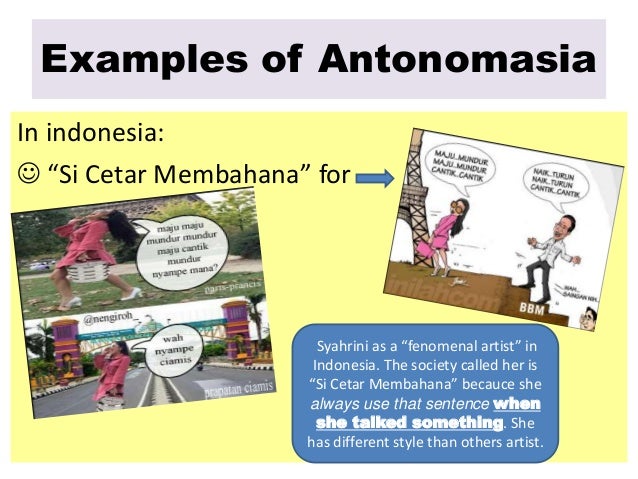Conversion
w Conversion: this process is also known as zero-derivation. This process changes the part of speech and meaning of an existing root without producing any change in pronunciation or spelling and without adding any affix.
w Process where by an item is adopted or converted to a new word class without the addition of an affix.
Conversion to noun: de- verbal: 'state' love, want, desire
'event/activity' laugh, fall, search
'object of V' answer, find
'event/activity' laugh, fall, search
'object of V' answer, find
De-adjectival: there is no very productive pattern of adjective-noun conversion. Examples:
I'd like two pints of bitter [=type of beer].
They're running in the final [=final race].
Conversion to verb:
De- nominal: 'to put in/on N' bottle, garage
'to give N', 'to provide with N ' coat, mask, oil, plaster
'to send/go by N' mail, telegraph, bicycle, boat
De- nominal: 'to put in/on N' bottle, garage
'to give N', 'to provide with N ' coat, mask, oil, plaster
'to send/go by N' mail, telegraph, bicycle, boat
De-adjectival: (transitive verbs) 'to make adj'
or 'to make more adj' calm, dry, dirty
(intransitive verbs) 'to become adj' empty, narrow, yellow
Types of Conversion
w From Verb to Noun
to attack à attack
to hope à hope
to cover à cover
w From Noun to Verb
comb à to comb
sand à to sand
party à to partyIn some cases, conversion is accompanied by a change in the stress pattern known as stress shift.
transpórt (V) à tránsport (N)
rewríte (V) à réwrite (N)
condúct (V) à cónduct (N)
subjéct (V) à súbject (N)
Examples
I need someone to come to the blackboard.
Is there a volunteer?
Someone has to volunteer.
Otherwise, I will volunteer someone.
w From Name to Verb
Harpo à to Harpo
Houdini à to Houdini
w From Adjective to Verb
dirty à to dirty
slow à to slow
w From Preposition to Verb
out à to out


. What is Antonomasia?
Antonomasia (pronounced an-tuh-nuh–mey-zhuh) is a literary term in which a descriptive phrase replaces a person’s name. Antonomasia can range from lighthearted nicknames to epic names.
The phrase antonomasia is derived from the Greek phrase antonomazein meaning “to name differently.”
Examples of Antonomasia
Oftentimes, antonomasia is used to call attention to a certain characteristic.
Example 1
Imagine that you have a friend who is a fantastic chef, and you want to say hello.
Normal sentence:
“Oh, look! Sam’s arrived!”
Sentence with Antonomasia:
“Oh, look! The great chef has arrived!”
Here, the use of antonomasia allows you to greet your friend with a nickname which also reveals something about his character: he’s a great chef.
The importance of using Antonomasia
Antonomasia can provide someone with a strong epithet which further celebrates and memorializes their great deeds. In advertising and pop culture, such wording can also further celebrate the famous, such as The Beatles as “The Fab Four.”
Uses for antonomasia vary slightly depending on the time period. In the past, antonomasia would be used to designate class members, as oftentimes people’s names were linked to their professions. Antonomasia was also used in the past to give positive names to strong warriors and negative names to weak or nasty people.
Here are a few examples of antonomasia in the past:
- Aristotle as “The Philosopher”
- Winston Churchill as “The Great Commoner”
- William Shakespeare as “The Bard”
In this way, the past is similar to the present, as we tend to use antonomasia purely for enjoyment and fun with nicknames.
Antonomasia vs Archetypal Names
Antonomasia and Archetypal names both provide characters with nicknames, but they do so in different ways. Whereas antonomasia is not a proper name, archetypal names are proper names. They are like antonomasia in that they use characteristics of a person, but they are used directly within the name.
Here is an example:
You have a friend who is from Texas.
Archetypal Name: Tex
Tex references Texas, and for this reason, this person’s name is a reflection of where they once lived.Antonomasia: Cowboy Dave
By calling your friend Cowboy Dave, you are referencing Texan culture, but not directly naming him after it. For this reason, the nickname is considered antonomasia rather than an archetypal name.
In Closing
provides characters with more exciting names and nicknames which reflect certain characteristics, feats, or professions. Although we witness serious and royal antonomasia less often these days, we still use antonomasia in the form of nicknames on a daily basis.
Tidak ada komentar:
Posting Komentar